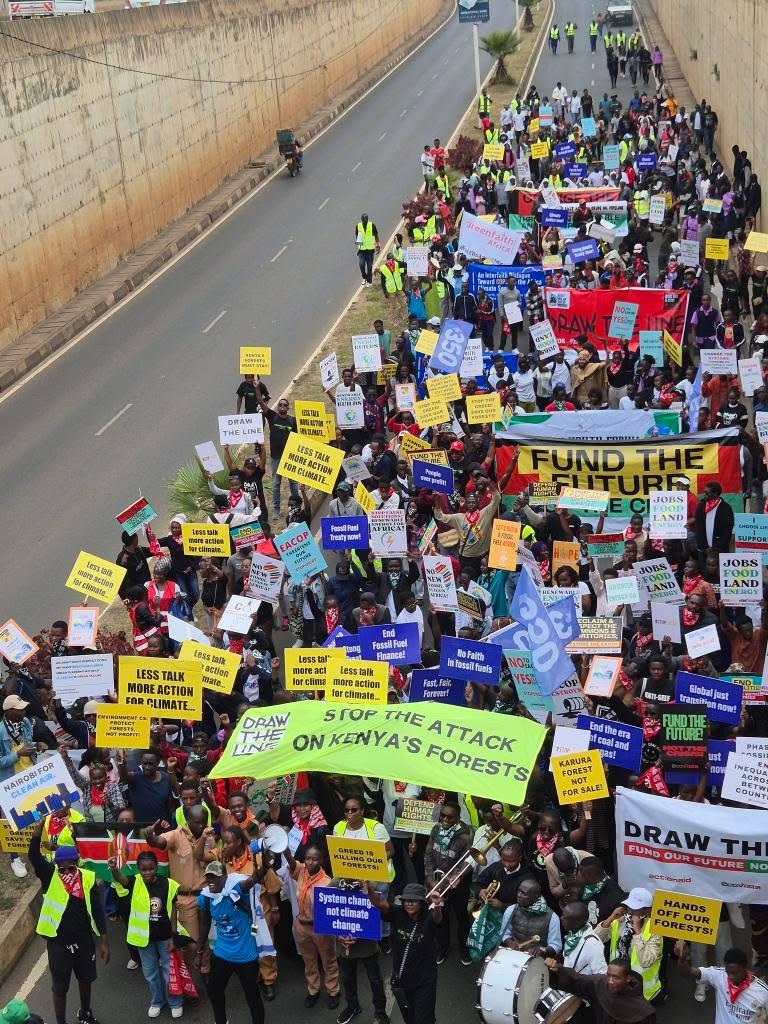+254797 813499

Posted by Doddy Collince OKelo on 29-Sep-2025
With the climate crisis pressing harder than ever, Nairobi became a stage for urgency, solidarity, and action. From 19–20 September 2025, the city joined a global wave of mobilisations under the banner Draw the Line, a campaign that began with Indigenous leaders in the Amazon and Pacific and has since become a rallying cry across continents.
The timing was deliberate. Just days earlier, the Africa Climate Summit (ACS) in Addis Ababa had concluded. At the same time, the United Nations General Assembly (UNGA) marked its 80th anniversary in New York, where African voices insisted that half-measures were no longer enough. Ten years after the Paris Agreement, global temperatures continue to rise, and Africa, though contributing less than 4% of global greenhouse gas emissions, shoulders the heaviest burden. Droughts, floods, food insecurity, and forced displacement now define daily reality for millions across the continent.
The Nairobi mobilisation set out to confront this injustice by interlacing advocacy, artistry, spirituality, and grassroots organising into a common stand for justice. It unfolded over two days, each carrying its own weight and purpose.
Friday, 19 September - Interfaith Forum
The movement began at the Catholic University of Eastern Africa with the Interfaith Youth Forum on Peace and Integral Ecology, convened by JPIC Franciscans Africa and partners. This year’s gathering marked the 10th anniversary of Laudato Si’ and the 800th Jubilee of St. Francis’ Canticle of Creatures, grounding ecological justice in faith and spirituality. Hundreds of young people, religious leaders, and civil society actors gathered to turn their eyes and their conscience toward climate justice, seeing it as a moral, spiritual, and social summons echoing too loudly to be denied. Discussions tackled debt cancellation, human rights, and the ecological debt owed by the Global North to the Global South. The conclusion was urgent yet unifying that, Peace with creation is inseparable from peace among people.
Saturday, 20 September - Procession and Carnival
On Saturday, the mobilisation spilled onto Lang’ata Road, where more than 2,000 participants marched from the Kenya Wildlife Service to the Catholic University of Eastern Africa. Skaters, cyclists, schoolchildren, interfaith leaders, human rights defenders, and indigenous groups transformed the highway into a moving mural of resistance and hope. The climate carnival and fair at the Catholic University of Eastern Africa (CUEA) celebrated diversity through music, art, and cultural expression, symbolising the future Africa seeks, one rooted in clean energy, justice, equity, and dignity.
The carnival amplified the global campaign’s five core demands. Energy must transition away from fossil fuels toward fair, financed clean systems. Finance must mean debt cancellation and climate funds delivered as grants, not loans. Justice requires placing workers, women, youth, and marginalised voices at the centre of solutions. Democracy demands the protection of civic space and the exclusion of polluters from politics. Peace calls for demilitarised climate action and the redirection of resources from arms to education, healthcare, and renewable energy.
For Africa, the demands cut closer to the bone.The call was to end fossil fuel colonialism, pay the climate debt, and restore land and food sovereignty to local communities. Campaigners drew attention to ongoing threats such as the East African Crude Oil Pipeline (EACOP), LNG projects in Mozambique, and drilling in the Congo Basin. These projects, they insisted, displace communities, destroy ecosystems, and lock the continent into poverty.
Saturday closed with community-driven events and digital mobilisation. Online, activists leveraged the Strava platform for the “Draw the Line for 1.5°C” virtual action, enabling thousands across Africa to participate by drawing lines on a virtual map. Offline, local groups hosted reflection circles, sounded out lessons from the carnival, and mapped next steps toward COP30. The mobilisation’s energy spilled into churches, schools, and grassroots forums, proving it was not a one-off spectacle but a stepping stone in the continent’s long-term climate justice struggle.
What Nairobi witnessed was a declaration that Africa refuses to remain a passive victim of the climate crisis. It was a demand that global leaders stop negotiating the continent’s future in closed-door boardrooms while communities continue to pay the price of climate breakdown. From Nairobi to Johannesburg, from Cotonou to Suva, the Draw the Line mobilisation carried one resounding truth. Our future belongs to people, not polluters.
As the world turns toward COP30 in Belém, Brazil, the message from Nairobi is unambiguous. Empty dialogue is no longer acceptable. Action must be maximised. Fossil fuels must end. Climate finance must be delivered. People and the planet must be protected. Sikiliza Sauti Yetu. Dunia Inaita. Listen to our voice. The world is calling.
By Doddy Collince Okelo
0 Comments